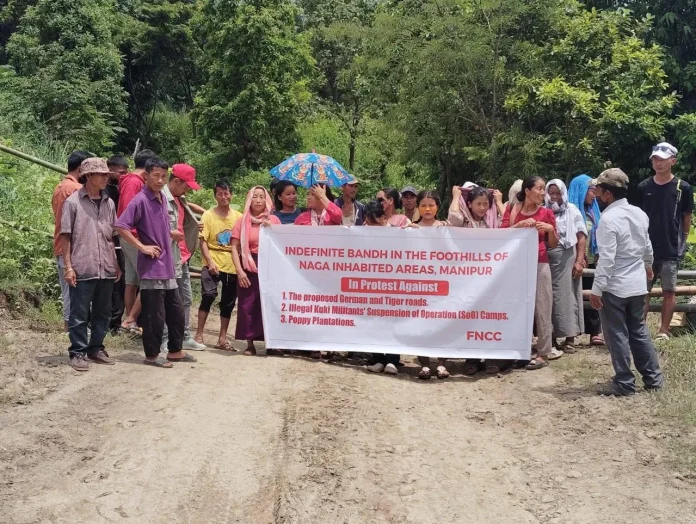Imphal, July 21: The Kuki-Zo Council (KZC) has strongly condemned the ongoing bandh called by the Foothills Naga Coordination Committee (FNCC), calling it “inhumane” and “unchristian,” and demanded its immediate withdrawal due to its severe impact on the movement of the Kuki-Zo community across parts of Manipur.
The indefinite bandh, which began at midnight on July 18, has significantly disrupted daily life and transportation in key districts including Kangpokpi, Tamenglong, and Noney. The blockade, enforced through roadblocks made of logs, stones, and barricades, has left commuters stranded at locations like Makhan, Tongjei Maril (Old Cachar Road), Dolang Chiru, the Tupul-Noney Road, and Longsai-Khoupum Road.
In a statement, the Kuki-Zo Council expressed deep concern over what it termed an orchestrated targeting of Kuki-Zo people’s freedom of movement through Naga-inhabited regions. “More than 150 Kuki-Zo individuals were mercilessly killed, over 7,000 homes were reduced to ashes, and more than 360 churches—symbols of our shared Christian faith—were destroyed or desecrated,” the statement said. “In the aftermath of such atrocities, our people have been left with no viable option but to seek alternate routes for movement.”
The council described the FNCC’s blockade as not only unconstitutional but also a violation of basic human and religious values, saying, “Blocking the movement of an entire community is inhumane and unchristianly.”
The bandh was initially enforced by the FNCC to protest the alleged “unauthorised construction” of the Tiger Road project to connect Churachandpur and Kangpokpi districts through Naga-inhabited areas. The FNCC has also demanded the dismantling of camps operated by Kuki militant groups under the Suspension of Operations (SoO) agreement, and unchecked poppy cultivation.
Supporting the FNCC’s stance, the Eastern Liangmai Naga Chief Chairman Association raised concerns over what it claims are attempts to rename roads and settlements within Naga ancestral territories. The association called such moves “violations of cultural, historical, and territorial rights,” and urged that they be reversed to preserve Naga identity and land integrity.

